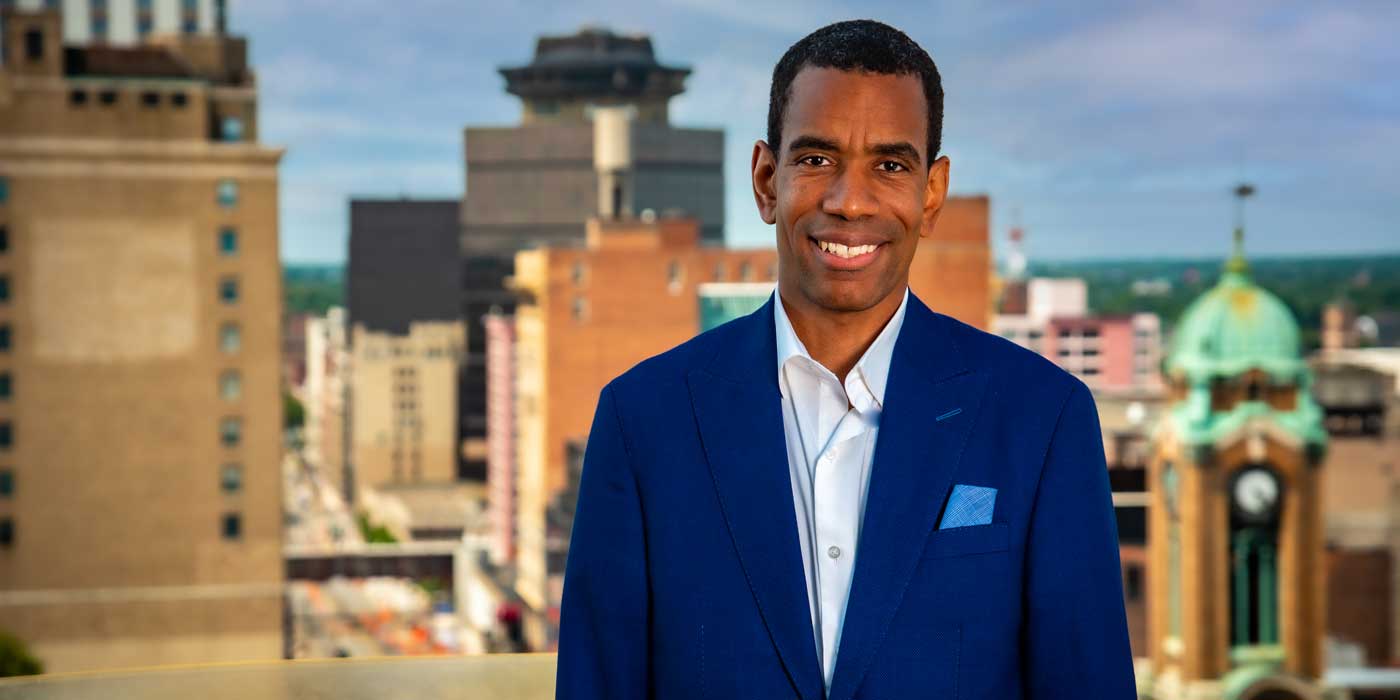THEIR LIFE'S WORK
Orchestrating Change
Malik Evans praises action and collaboration
By Chris Farnum

The next mayor of Rochester, New York, says a strong leader is like an orchestra conductor. Great results come from collaborating with people who bring different skills.
"Even though I can't sing, I can get the person who can sing and the person who can play the flute and get them in the room and make things happen," says Malik Evans '17G — who was elected in November 2021.
Evans says he works to bring people together "to advance a common cause. That's how you really start making change. There's no changemaker that ever operated in a vacuum." He hopes to inspire others to help improve their communities.
Evans got started in leadership as a teen. He was part of creating a City-County Youth Council to help local young people get involved in community service. The group nominated him as chair when he was 15. He helped found Rochester Teen Court for young, nonviolent offenders and served as one of that rehabilitation effort's first teen advocates.
At age 23, he became the youngest person elected to the Rochester City School District school board, and he served for 14 years — including five years as president. He's especially proud of collaborating with early childhood advocates, educators, legislators, and fellow school board members to expand prekindergarten in the Rochester City School District to a full-day program and opening it up to 3-year-olds as well as 4-year-olds, to prepare students for kindergarten.
"There's no changemaker that ever operated in a vacuum." — Malik Evans
Evans also has had a career in finance, working as an executive at M&T Bank and as the financial wellness manager at ESL Federal Credit Union.
His mother always told him to never stop learning. So in 2017, just as he started a successful campaign for City Council, he completed a master's degree in management at Nazareth College.
"What I was seeking at that time was continuous improvement," says Evans. "I had already been school board president. I had been a vice president at M&T. I was at ESL. So I had been at the top of my profession in community leadership, in corporate leadership, but I always felt as though — as a leader — you need to find a way to continuously improve."
He says he continues to use what he learned at Nazareth. One lesson that stays with him: "People don't leave their companies — they leave their bosses," says Evans. "That just opened up a whole thought process in my head about the importance of your team, working with people, and employee engagement."
He'd like to see more people get engaged in their communities. Since winning the primary, he's heard from many people who say they want to help, but they don't know how.
His advice: "Start within your respective place or space. It might be Little League. It might be going to a town board meeting and working on an issue. Or it might be addressing a park that's been neglected in your neighborhood." Don't compare yourself to others, he adds; do what you are able to do.
"Dr. (Martin Luther) King said anybody can be great, because anybody can serve," says Evans. "But service doesn't mean running for office or having a title. It means serving in your church or your synagogue or your mosque. Or volunteer to go help at a senior home." Or mentor, donate, or take courses to improve yourself as a person, he adds.
Whatever the change you seek, he says, "You have to make that first move."
Chris Farnum is a director in Marketing and Communications at Nazareth.